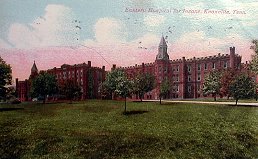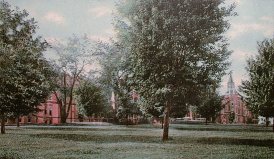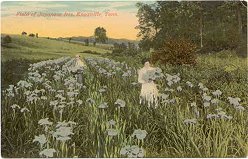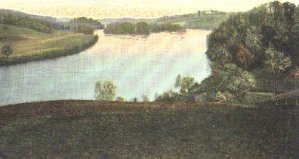Excerpts
from the Autobiography
of a Cherokee Chief
by John J. Craig
"Translated from the original manuscript
by Miss Mamie C."
Published 1883 by S. B. Newman Printers, Knoxville.
Original document located in Tennessee
State Library & Archives, Nashville.
Introductory.
The scenes and incidents
herein attempted to be described were recorded more than ten years ago. Since
then, this celebrated place has become the property of the State, and the very
spot from which this sketch was taken is now being cleared away for the erection
of an "Insane Asylum," which it is hoped and believed, under the direction of
Maj. R. H. Armstrong, Col. C. Powell, and
J. C. Flanders, our worthy State Commissioners, will be the
most convenient, and in all other respects the most attractive one now in the
Southern States.
 |
 |
| Views of Eastern
State Psychiatric Hospital, circa 1910-1915. |
The Return to Knoxville.
The last gun had been fired, the flag of the "Lost
Cause" was lowered, and our wrecked and rudderless bark drifted back to the stricken
and blood-stained land of our birth. But there was no kindred voice here
to welcome us now. Strange forms hurried along the streets, and unknown
faces would meet and pass us every hour in the day. The vials of wrath had
been poured out in the air, and some who once knew us would know us no more forever.
Yet there was one spot which was still common and sacred to us all. There
was no distinction there, and we could walk in Gray Cemetery, and scatter
fresh flowers, every day, upon the long-neglected graves of our little dead. During
the terrible "siege of Knoxville," the leaden messengers of death carved strange
figures upon their little tombs, but the wildest shout of contending warriors
disturbed not the dreamless rest of the sleeping innocents.
The Deserted House and the Old Lombardy
Poplar.
We hastened our preparations and started for the
old ancestral home in the country. As we drew near, the dreadful footprints
of war grew thicker around us. During our absence, thirty thousand hostile
soldiers had occupied the "abandoned Rebel property," and the blackness of ruin
and devastation was around it. But one familiar object met our anxious gaze,
and hailed the wanderer's return. The solitary Lombardy Poplar still stood
at the gate, tall and erect, like some lone sentinel at his post, and faithful
even unto death. There it had stood in the sunshine and the storms of heaven
for more than fifty years, and waved its
"Welcome to the coming, and God-speed to the parting guest."
Jackson and Polk,
Grundy, Scott and Woll, White
and Williams and Ramsey (warriors, statesmen,
and historians), and a long line of now distinguished dead, had passed under its
bows to the hospitable mansion of Old Captain Lyon. But
alas! Ichabod was now written upon its brow, and it stood a melancholy
monument of our changed fortunes. A thunderbolt had crashed down its side,
and it was dying! The ravens flapped their funeral wings amid its perishing
branches, and the owls and the bats flitted through the deserted halls of the
dear old homestead. We drove them away and sat ourselves down to rest and
to weep. Father and mother — brothers and sisters and domestics, all
had departed, and left us alone to shed burning tears over what was lost and gone
forever.
A May Evening on Lyon's View.
 |
| Iris field near
Lyon's Bend, circa 1910. |
Just three days before the approaching anniversary
— our Silver Wedding — M_____ [sic]
and I took our accustomed evening stroll, and sat upon a hill,
"A gentle hill, green and of mild declivity,"
where oft we had sat before, in other and long gone years, and told our tale of
love, when
"Both were young, and one was beautiful."
A sad change had indeed come over all things else
that was dear to our memory; but the glorious panorama which now unfolded before
us had remained the same in all its original and impressive loveliness. The
locality still bore the name of our paternal ancestors, and during our wanderings
from home "Lyon's View" had become famous and was visited by thousands. It
has often inspired the pen and pencil of the poet and the painter; but none, in
my opinion, has ever done justice to the marvelous beauty of the landscape. Indeed,
it cannot be done without an almost hourly observation every day in the year,
to catch the fleeting and ever-changing lights and shadows which chase each other
over the waving corn-fields of the valley, and up and down the sides of the great
"Smoky," which, separated into three distinct and parallel ranges, loom up in
the dim distance and lift dome upon dome, until they become literally mingled
and lost amid the clouds of heaven.
Ah! my dear Charles, I wish it was in my power to
give you even a faint outline of the enchanting prospect which here surrounded
us on all sides. But I cannot. I only hope that you will yet, some
day, pay that long-promised visit to the "Nation" and see it for yourself. It
is worth a trip across the Atlantic to breathe one hour of its inspiring influence.
As I have just said, we sat looking to the South
and to the East. We had traced the undulations of the Blue Ridge from
the volcanic peaks of "Bald Mountain," in North Carolina on the left, far down
into the gold-fields of Georgia on our right, when our eyes fell upon the dim
outlines of "Old Chota" and "Chilhowee," which brought back memories of long ago.
There, just thirty years before, it had been our fortune to receive the
unsophisticated hospitalities of one of "nature's noblemen," when, on a summer's
frolic, in company with a few well-remembered and still dearly beloved companions
of our youthful days. And now, aided by pensive memory, as our eyes swept
along this vast range, we imagined we could almost see the dusky forms of the
remnants of my unhappy Tribe as they lingered mournfully around the hunting grounds
of our Fathers, like lost and discontented spirits from another world.
The Holston.
 |
| The river near
Lyon's Bend, circa 1910. |
Turning to our left, and
to the Northeast, we catch the first glimpse of the mystic Tennessee as it comes
sweeping round a sharp bend from the East and heads directly to the South. Passing
for a moment behind a rocky head-land, it again appears in full view a few hundred
yards further down, and moves on before us.
The hitherto placid surface of the stream is now
ruffled and disturbed, and its motion accelerated. A sullen plunge, and
broken waves reeling back with suppressed murmurs to the shore, indicate the
proximity of those dangerous rocks which line the bottom just above the "falls,"
and which have so long been the terror of the unskilled and inexperienced boatman.
"Lyon's Shoals," flanked by a government stone dam, comes next in full
view, a few hundred yards below. The natural bed of the river is here
considerably expanded, but its waters have been artificially contracted into
a narrow "boat-chute," and driven down the western shore with irresitible force
and the speed of a race horse. In seeking its natural outlet, however,
the main body of the water is precipitated against the stony breast of the dam
and broken into a thousand rills. Gliding about under the rays of the
setting sun, these are all aglow, and their reflected colors gleam with the
splendor of gems. Presently, a steady and prolonged roar, like the shout
of victory, tell us that the barrier is passed and the gladdened waters are
free. After embracing a little Island below, they again unite and dash
off in a straight line to the South, far as the eye can reach, until checked
and turned aside by the foot of "Unaka." Following in its course the grassy
banks and cultivated lowlands on either side, and the little spots of deep green
wheat scattered here and there on the sides and far up the tops of the distant
hills, mark the gradual foot-steps of civilization, whilst the smoke curling
up from the valley below, tell where the "log cabin" of the "first settler"
rises by the side of some living spring.
Love's Lone Valley.
Suddenly the harsh, shrill sound of a steam whistle,
behind, caused us to turn to our right, and to the west, in time to catch a glimpse
of the evening train on the East Tennessee, Virginia and Georgia Railroad, as
it dashed around a curve and moved up to "Erin Station," less than one
mile distant.
The prospect in this direction, though not so grand
and imposing, is scarcely less picturesque and beautiful than the one we have
just been contemplating. In fact, it is a part, and forms an appropriate
back-ground to the magnificent picture. Innumerable knolls, covered with
primeval forest and flanked by dark ravines, converge from every direction into
a narrow but exquisitely lovely valley, which leads to the "Station," and passing
beyond stretches away towards the Cumberland Mountains, which are now seen to
rest like a dark thunder cloud far down upon the Northwestern horizon. Down
the center of this valley, fed by perennial springs, and literally fringed with
wild roses and the hawthorn, the laughing waters of Fourth Creek may
be traced as they come leaping from rock to rock, down an inclined plain of thirty
feet to the mile, directly towards us. Turned by the base of the hill upon
which we set [sic], the now foaming brook darts
off, at right angles, some two or three hundred yards to "Lyon's Old Mill,"
where it is arrested and literally "broken upon the wheel." But,
as if in compensation for its unusual labors, it here receives back the celebrated
"Big Spring" of purest water, and, animated with new life, it gracefully turns
to the East, and sweeps onward for a mile further, and enters the river at the
foot of the shoals and abreast of the little island I have before mentioned as
lying immediately below them.
The Open Lands.
Following the course of this brook, we are brought
back to our former position, and, looking towards the South, we now observe
that the creek on the right and front, and the river on our left, forms the natural
boundary of some two hundred acres of open, cultivated river-bottom lands, which
roll out in gentle undulations from our feet to the margin of both streams, and
upon almost every square yard of which the smallest domestic animal may be seen
with no other aid than the naked eye. Beyond the creek, and springing precipitately
from its banks, immense hills, almost mountainous in their proportions, and covered
with a dense forest of decedeous [sic] and tall
pine trees, rise one behind the other and fall back in regular steps to a faint
blue line in the distant horizon, which tells where the Holston, having changed
its course, is struggling through and coming back almost directly toward us.
The Island.
It is the close of a bright Spring day. The
sun is setting, and a glorious transfiguration is coming over the scene. The
shadows from the tall hills have already crept more than half across the river,
and is forming a dark-blue background to the lovely little island, which
sets like a gem upon the bosom of the waters, and is reflected back in all its
charming outlines with the fidelity of a mirror. The hedge of dark-green
cane which fringe its borders has ceased its fluttering, and is motionless and
still. Its frail reeds are bending above the wave like silent worshippers
around some holy shrine, whilst the evening winds are whispering their mysterious
prayers through the new-born leaves of the great poplars and walnuts as they lift
their giant arms to heaven in benediction of all below.
Pastoral.
Lon has finished his day's plowing
and slowly unhitching his team, whilst he fills the air with one of those wild
and incoherent refrains so peculiar to his thoughtless and once happy race, Old
Uncle Bob is calling up to the stock "to feed," and the lowing
cattle are slowly wending their way towards the barn. A hundred frisky little
lambs are capering over the lawn, and imitating the antics of innocence and childhood,
now springing sidewise in the air, and then playfully running up and butting their
patient mothers in the side, as if to provoke their parental resentment. But,
like some other patient mothers we have known, the gentle creatures move on seemingly
unconcerned, but really, as we suspect, more pleased than otherwise at the audacious
pranks of their mischievous little ones.
The Chase.
Suddenly, a startling cry falls upon the ear. Looking
towards the "locust thicket" directly before us, we see that Frank, our ferocious
old yard dog, and Johnnie's two young hounds — Ringwood
and Trouser — have started a rabbit and are in full pursuit. Old as
he is, Frank is ahead, perfectly silent and stretching his powerful limbs to their
utmost capacity. Ringwood and Trouser, shoulder to shoulder,
are straining behind, and opening at every jump, with that peculiar exciting and
musical cry which belongs alone to the "old Virginia fox-hound" of purest breed.
Another wild cry, and here comes Willie and Johnnie
— our only boys — with caps in hand, running and yelling like two young
heathens, as they are, and urging the already furious dogs on to still more desperate
exertions. Our sympathies are with the poor little rabbit, who with the
instincts of life is flying to his hole in the banks of the river. He is
almost lost. Frank's great jaws are open to receive him. Suddenly
he stops and stoops flat upon the ground. Frank makes a spring, misses his
grab and plunges headlong full twenty feet beyond. Quick as thought, the
cunning and terrified little creature springs to one side and is fifty yards away
before Frank recovers the trail and is himself again. A few seconds more
and the panting little fugitive is safe in his castle. The boys and the
dogs are foiled, and we are sincerely glad of it.
Passage of a Fleet of Flat-Boats
over Lyon's Shoals.
Absorbed as we had been with the chase, we had failed
to notice the approach of a fleet of "Flat-Boats" which, ladened with
the products of the upper country, had already rounded the headland, and was moving
upon the shoals with accelerated and dangerous speed. As if guided by some
concerted signal, they all fell into line and one by one followed the foremost
and largest boat as it entered the chute, and seemed rushing into the very jaws
of destruction. We had now become apprehensive for their safety, and watched
their further progress with intense and almost painful interest.
The attitude of the calm and fearless pilot, as
he took his stand upon the deck of the foremost boat, first attracted our attention.
Elevated some feet above his companions on the lower deck, he stood solitary
and alone, and motionless as a statute. His hands rested upon the handle
of a long sweep, or steering oar, which extended back over the stern of the boat,
and sustained at its other extremity, just above the water, a broad plank or blade,
which formed an essential part of the primitive "rudder."
The boat had now reached the "grip" of
the shoals, and its real danger. The waters, as if indignant at the audacious
intrusion, were lashing themselves into foam, and bubbling and boiling around
the devoted barge — now dashing their angry waves against its sides, and
anon hurling their small artillery of spray over the brow and up into the very
face of the guide, as if determined upon their instant and mutual destruction.
But onward, still onward, moved the apparently doomed and helpless vessel
upon the great rocks of the dam. From our stand point, it was plain that
all was lost. Yet, seemingly undismayed, the pilot stood at his post. His
quick eye glanced along the shore and then fixed steadfastly upon the turbulent
waters ahead, as if penetrating the murky element in search of some unwelcome
object below. Suddenly the long blade of the oar fell like a flash of lightning
into the water. A brawny breast came to the aid of two powerful arms, and
yielding to the overwhelming pressure of an hundred foot lever, the course of
the unwieldy craft was instantly changed, and driven towards the western banks
with the directness and almost the speed of an arrow. Gliding along upon
the edge of the threatening rocks, it sprung into the middle of the "chute,"
and a moment after a joyous shout proclaimed its safe arrival upon the deep waters
below. All the rest followed in like manner and in quick succession, when
just as the last one passed the "fatal reef" the blast of a bugle horn, proclaiming
"All is well," rang out on the still air, and come echoing and re-echoing back,
in tones so wild and strange, and yet so sad and plaintive, that I involuntarily
sprung to my feet and shouted:
"Oh! boatman, wind that horn again!
For never did the list'ning air
Upon its lambent bosom bear
So wild, so soft, so sweet a strain."
But the boatman had passed beyond the sound of my
voice, and soon the whole fleet dwindled into mere specks upon the silvery thread
of the stream.
Twilight.
Twilight was fast falling on the vale below. The
cock had sounded his last warning note, and his tired family had gone to their
rest. The pugnacious little blue birds, however, were still struggling for
their perch in the cedars above us, and the solemn crane was winging his sad and
solitary flight towards that mysterious home, into which no ornithologist has
ever yet intruded his presumptuous inquiry. The sun had passed below the
western hills, but the tops of the tall trees were yet blushing under its parting
smile. It was the Muezzins hour for prayer, and a holy stillness fell upon
the world. Suddenly a quivering vibratory motion was observed in the atmosphere,
and the whole heavens flushed with a ruddy glow. The far-off mountains seemed
to spring nearer, and its snow-covered bosom catching up the reflected glories
of the dying god, almost blinded the eye with one unclouded blaze of celestial
light.
The Closing Scene.
There was no moon in the heavens, and the darkness
of night was gatheirng round the sides of Chilhowee. Far beyond, light,
fleecy-looking clouds, tinged with purple and gold, came gently wafted into view,
and gradually unfolding spread away to the right and to the left, and rested their
feathery tips upon the horizon's verge. As the solid and compact body rose
to the zenith and bowed its majestic form above the mountains, it required but
little effort of the imagination to liken it to some Archangel poised on outstretched
wings and gazing down upon a scene from which no civilized being ever yet turned
away and said in his heart, "There is no God."
The Inspiration.
How long we had sat in profound silence, gazing
upon this enchanting scene, I know not. Suddenly M_____ turned her mild
blue eyes full upon my own, and, seizing my hand, exclaimed in all the persuasive
earnestness of long ago: "Oh! you must give me a poem for my wedding-day present."
"A poem," said I, startled as if by a shock of electricity."
"Yes, a poem"; I know you can write one
if you will only try. You used to write them on all occasions when
you were young, and in love, and I would not be flattered to think you
were less inspired now than you were twenty-five years ago."
I was fairly trapped. Heathen as I was, like
all other foolish boys who ever were in love, since the days when David played
upon the harp, and Solomon sung songs, I had been guilty of the folly of indicting
"lines" to some "Mary in Heaven" or "Black-eyed Susan" upon
earth, and now my sins were coming back to plague me in my old age. But
there was no alternative, and I had to accept the situation, which I did with
the best grace possible, and entered at once upon my task. I found it not
so difficult as I had at first imagined.
I took for my theme the simple story of our married
life as the one most appropriate for the occasion, and, as my ambition was modest,
I was sure that my failure could not be disastrous. I found, somewhat to
my surprise, that all my boyish talent for jingling ever [sic]
thought into rhyme came back to me almost without an effort, and so my
task was duly finished and a copy of the following verses was handed to each of
the guests at the celebration of the Silver Wedding, a few evenings after. I
give them to you just as they originally fell from the pen, or rather pencil,
of
"The poor Indian! whose untutored mind,
Sees God in clouds, or hears him in the wind."
To My Wife.
on the Twenty-Fifth Anniversary of Our Wedding Day.
Five and twenty years have fled,
Since that sweet eve in May,
When you and I, my love, were wed,
And started on life's way.
No silken sails did waft our bark,
No golden freight had we
Gathering clouds hung chill and dark,
And gloom was on the sea.
But Hope sat smiling on thy brow,
And Faith was in thy breast,
For thou did'st trust to my young vow
And Heaven for all the rest.
Our shallop rode the threatening wave,
And danced amid its foam;
For I was young, and strong, and brave,
And bore thee to'ard my home.
That distant land of "Sun and Flowers,"
Where sweetest warblers sing,
And carol mid'st their myrtle bowers,
A long and joyous spring.
There passed our spring of wedded years
Bright flowers around us grew;
Some sweet buds were bathed in tears,
And faded from our view.
Some are blooming 'round us here,
In thy Ancestral Hall,
Where once we shed the parting tear,
And sighed farewell to all.
I scarce believe it can be so
It seems a dream to me,
That Five-and-Twenty years ago,
We started on life's sea.
Ah! many a storm has swept that sea,
And many a bark gone down,
But thou art left, my all to me,
A blessing and a crown."
Then, here, I plight my vows again,–
And here let thine be given,--
That, though we part on earth, or main,
"Thou'lt still be mine in Heaven."
Lyondale, May 10, 1872.
J. J. C. [John J. Craig]
[ Return to Knox County TNGenWeb Biographies
Page ]
[ Return to Knox County TNGenWeb Main Page
]
All HTML code on this page was created by
and copyrighted ©1999-2009 to Billie
R. McNamara. All rights reserved. Please direct all questions
and comments to Ms. McNamara. Background graphic image was borrowed from
Fred Smoot. Used by permission.
This page was last updated .
 visitor.
visitor.





